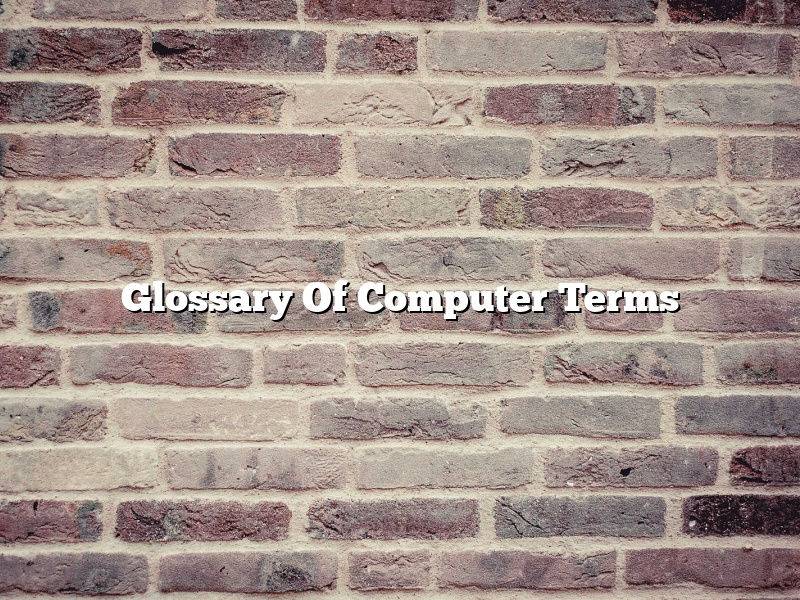A glossary is a collection of terms and their definitions, often arranged alphabetically. In the context of computing, a glossary of computer terms is a useful resource for anyone who wants to learn more about the terminology used in the industry.
This glossary includes over 1,000 terms and definitions, arranged alphabetically. Terms are defined in plain English, making them easy to understand.
A
access
The ability to use or enter data into a system or to make use of its services.
active document
A document that is open and being worked on.
address
A unique identifier assigned to a particular location in computer memory.
administrative password
A password that allows an administrator to make changes to a system.
Adobe Flash
A multimedia and software platform used to create animations, games, and rich Internet applications.
Adobe Reader
A software program used to view PDF files.
Adware
Advertising software that is installed on a computer without the user’s consent.
AES
Advanced Encryption Standard, a symmetric-key encryption algorithm.
agent
In computing, an agent is a program that performs tasks on behalf of another program or user.
AI
Artificial intelligence, the ability of a computer program to learn and make decisions on its own.
algorithm
A set of instructions for performing a task, often used in the context of computing.
alias
A name that is assigned to a file or a folder to make it easier to find.
All-in-one
A desktop PC that combines the functions of a monitor, CPU, and keyboard into one unit.
Alt key
A key on a computer keyboard that is used to access alternate character sets.
application
A software program that performs a specific task, such as word processing or Web browsing.
ASCII
American Standard Code for Information Interchange, a standard encoding system for text files.
ASP
Active Server Pages, a Microsoft technology for developing dynamic Web pages.
assembly
In computing, an assembly is a program or collection of programs that is written in a low-level language and assembled into a machine-readable format.
ATA
Advanced Technology Attachment, a standard interface for connecting storage devices to a computer.
ATM
Asynchronous Transfer Mode, a technology for transmitting data over telephone lines.
attacker
A person who attempts to gain unauthorized access to a computer or network.
authenticate
To verify the identity of a user or system.
authorization
The process of granting permission for a user to access a system or its resources.
backup
A copy of data that is stored in a separate location in case the original data is lost or damaged.
bandwidth
The amount of data that can be transmitted over a network in a given amount of time.
BIOS
Basic Input/Output System, the software that controls the basic functions of a computer.
bit
A unit of information that can have one of two values, 0 or 1.
Bluetooth
A technology for wireless communication between devices.
boot
The process of starting a computer.
browser
A software program used to view Web pages.
buffer
A portion of computer memory that is used to store data while it is being transferred between devices.
Bug
A problem or flaw in a program
Contents [hide]
What is the glossary of computer?
A glossary of computer is a collection of terms and definitions that are specific to the field of computing. This can include terms related to computer hardware, software, networks, and more. A glossary of computer can be a valuable resource for those who are new to the field, as it can help to provide clarity around the many terms and concepts that are used in computing.
Is there a computer dictionary?
A computer dictionary is a software application that helps users to find the definition of a word or a phrase. It also provides information about the usage of the word or phrase.
Most computer dictionaries provide the following information about a word or phrase:
-The meaning of the word or phrase
-The part of speech of the word or phrase
-The pronunciation of the word or phrase
-The origin of the word or phrase
Some computer dictionaries also provide the following information about a word or phrase:
-The synonyms of the word or phrase
-The antonyms of the word or phrase
-The usage of the word or phrase in a sentence
Computer dictionaries can be used by both native English speakers and ESL (English as a Second Language) students. They can be used to improve the vocabulary of both groups of people.
There are many different computer dictionaries available on the market. The most popular computer dictionary is the Merriam-Webster dictionary. Other popular computer dictionaries include the Oxford dictionary and the Cambridge dictionary.
What is computer term PDF?
PDF (Portable Document Format) is a file format used to present documents in a manner that is independent of application software, hardware, and operating systems. Each PDF file encapsulates a complete description of a fixed-layout document, including the text, fonts, graphics, and other information needed to display it.
PDF files are usually smaller than the equivalent bitmap files and can be opened and viewed on a variety of devices, including computers, smartphones, and tablets. They can also be printed, although the quality of the printout depends on the printer used.
What are the most basic terms to remember about a computer?
There are a few basic terms to remember when it comes to computers. Here are some of the most important ones:
Computer: A computer is a device that can store and process information.
Hardware: Hardware is the physical components of a computer, such as the motherboard, CPU, and RAM.
Software: Software is the collection of programs that run on a computer.
Operating System: An operating system is the software that controls the basic functions of a computer.
Application: An application is a program that performs a specific task, such as word processing or photo editing.
Browser: A browser is a program that allows you to navigate the internet.
Web Page: A web page is a document that is stored on a server and displayed in a browser.
Domain Name: A domain name is the name of a website.
URL: A URL is the address of a web page.
Internet: The internet is a global network of computers that communicate with each other using TCP/IP.
What is the basic terminology?
In any language, there are certain terms that are used more frequently than others. Learning the basic terminology of a language is an important first step in learning to speak and understand it.
In English, some of the most basic terms are nouns, verbs, adjectives, and adverbs. Nouns are words that describe people, places, things, or ideas. Verbs are words that describe an action or occurrence. Adjectives are words that describe a noun, and adverbs are words that describe a verb.
In addition to these basic terms, there are also a number of other terms that are important to learn. These include pronouns, prepositions, and conjunctions. Pronouns are words that take the place of a noun, such as he, she, it, them, and theirs. Prepositions are words that describe the relationship between two nouns, such as in, on, under, and beside. Conjunctions are words that connect two clauses or sentences, such as and, but, or, for, and so on.
Once you are familiar with these basic terms, you will be able to understand and speak English more easily.
What is a CPU unit?
Today’s computers are powered by a central processing unit, or CPU. This one component is responsible for performing all the calculations necessary to run the computer’s programs and applications. But what is a CPU unit, and what does it do?
The CPU is the brains of the computer. It executes the instructions that tell the computer what to do. It’s responsible for everything from starting up the system to loading and running applications to manipulating data.
The CPU is made up of a number of cores, which are the cores of the processor. Each core can execute a set of instructions at the same time, which makes the CPU faster. The more cores a CPU has, the faster it can run.
In addition to the cores, the CPU also includes a cache, which is a small amount of memory that stores frequently used data and instructions. This helps to speed up the CPU’s operations, because it can access the data it needs more quickly.
The CPU is also responsible for controlling the computer’s other components, such as the display, keyboard, and mouse. It communicates with these components through the system bus, which is a group of wires that carry data between the different parts of the computer.
So, what is a CPU unit? In short, it’s the heart of the computer. It’s responsible for running all the programs and applications, and for controlling the computer’s other components.
What are technical words?
What are technical words?
Technical words are words that are specific to a particular field of study or profession. They are often difficult to understand for people who are not familiar with the terminology of that particular area.
Technical words are used to describe specific concepts or objects that are unique to a particular profession or area of study. They can be difficult to understand for people who are not familiar with the terminology of that particular field.
Some examples of technical words include:
-Algorithm: a set of instructions that are used to solve a problem or complete a task
-Bandwidth: the range of frequencies that a communication system can transmit
-Cohort: a group of people who share common characteristics
Technical words are often used in academic papers or professional journals. They can also be found in textbooks or other reference materials.
When writing about or discussing technical words, it is important to use proper terminology. It is also important to be clear and concise when explaining complex concepts. In some cases, it may be helpful to provide definitions of technical words for readers who are not familiar with them.




